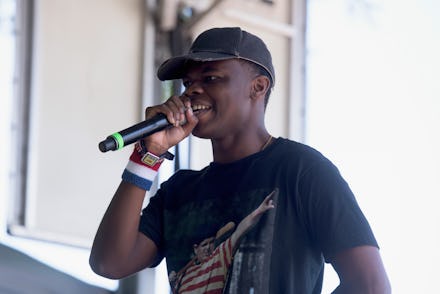Daye Jack and Killer Mike Reflect on Years of Police Brutality in New "Hands Up" Video

There are certain aspects of black history the country cannot afford to overlook this month. To celebrate the start of Black History Month, 19-year-old Daye Jack has come to help remind the world what those are. The Nigerian-born Atlanta-bred rapper on Monday released a short video splicing together footage from some of the most widely publicized instances of racially motivated police brutality.
The resulting montage serves as the visual for Jack's recent collaboration with rapper, public intellectual and Bernie Sanders supporter Killer Mike, titled "Hands Up." The name comes from the Black Lives Matter protest mantra, "Hands up, don't shoot."
To Jack, the words feel like more than a protest mantra. "We are living with this — we are living with our hands up and head down," he wrote in a Genius annotation of his song's chorus. "We are forced to live this way, constantly afraid because of our skin color."
"This is a call to action," he wrote in another.
Footage from the murders of Eric Garner, Sandra Bland and Walter Scott appear alongside images of the nation's response — Black Lives Matter protests and footage of Killer Mike speaking on CNN about Ferguson, Missouri, where Michael Brown, an unarmed black 18-year-old was shot to death by a police officer in 2014.
"We have essentially gone from being communities that were policed by people from the communities to being communities that are policed by strangers, and that's no longer a community, that's an area that's under siege," Killer Mike said in that 2014 interview. "We, as Americans, have to be more vigilant about policing the people that we pay to protect and serve us."
The video aims to provoke a similar feeling of collective solidarity. "The montage served as a way to show that despite the tragic subject matter, it brought people together from all walks of life in solidarity about something that should not be tolerated," director David Gallardo said in a statement, according to Billboard.
These events are not only black history — they are American history. Unless people learn from history and the visual evidence it leaves behind, they'll likely be doomed to repeat it.
Watch the full video below.